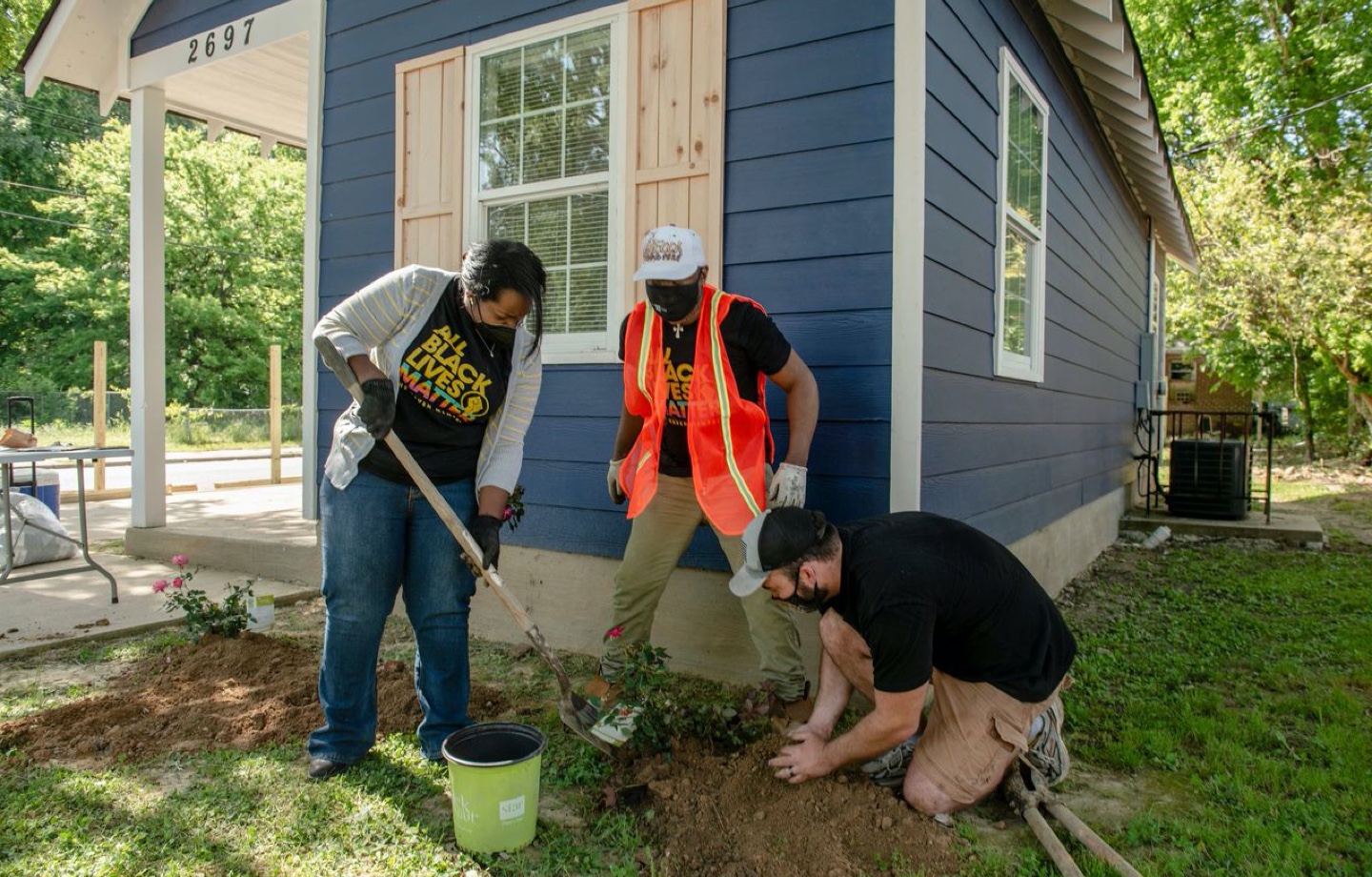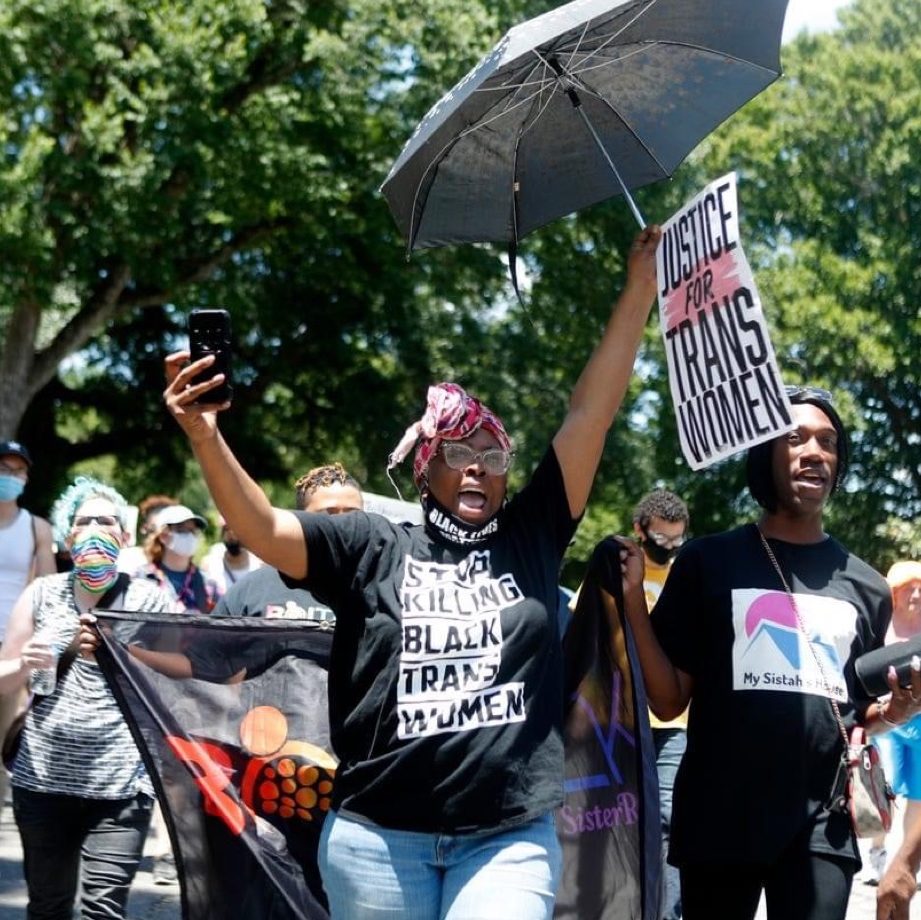Advocacy
The Nonprofit Building Homes for the Black Trans Community
Transgender individuals often experience discrimination, harassment, and homelessness. My Sistah’s House is advocating for Black transgender lives in Tennessee by providing housing, hot meals, and other life-changing resources.
It’s Friday afternoon in Memphis, Tennessee. Kayla Gore, co-founder and an executive director of My Sistah’s House — a nonprofit organization that provides support, health services, and safe spaces for the Black trans community — is packing meals to deliver to locals as part of the group’s Hot Meal Thursdays program. It rained the previous day, so this week’s meals are going out a day late. The switch means the volunteers she normally has helping her couldn’t be there, so she’s taking care of everything herself — people are depending on it.
“We do deliveries to people’s homes, we go out into a park where a lot of people who are experiencing homelessness congregate. We did go out yesterday and took out some boxes of food, but some people didn’t want to accept them because it’s food that needs to be prepared in the kitchen and they don’t have kitchens,” says Gore whose own experience with homelessness 10 years ago was a catalyst for My Sistah’s House. “I thought, ‘What are they going to eat tonight?’ We couldn’t provide the meals yesterday, that’s why we’re going to do it today. The food has to go. People are expecting meals.”
The Hot Meal Thursdays initiative was launched during Covid-19, when the organization had to put their Safe Streets Team on hold due to mandated curfews and stay-at-home orders. Pre-pandemic, volunteers for the Safe Streets Team would go out in the evenings and early morning hours to Midtown Memphis to hand out survival kits — bags filled with items like pepper spray, condoms, hygiene products — along with snacks, clothing, and shoes to transgender individuals who hang out and socialize in that area. The presence of volunteers also acted as an added safety measure against harassment.

However, My Sistah’s House is currently embarking on its most ambitious initiative to date — a plan to build 20 Tiny Homes for members of the trans community. Also born from Covid-19, the idea came about as a solution to the increased need for housing. During the pandemic, My Sistah’s House was at capacity, people were losing their jobs and their housing. Others didn’t have a place to go when stay-at-home orders were enacted.
Read More: Cohousing: The Sustainable Solution to the Urban Housing Crisis?
“Trans people are discriminated against when it comes to housing,” says Gore. “What kept coming up was we own this house. No one can tell us to leave. We’ve been the most comfortable in this space for the last three years that we’ve owned this house. We wanted to extend that to the community outside of offering them an opportunity to live here — but an opportunity to be a homeowner as well.”
So My Sistah’s House put their plan into action. The organization has already completed their first tiny home — a 480-square-foot design that serves as safe, stable housing for a transgender community member. They’re currently in the process of building two, 400-square-foot homes, and they’ll also construct a fourplex that offers four private living spaces that are 280 square feet each, along with a shared kitchen, bathroom, and outdoor common space. “We’re hoping this will reduce our cost and increase our impact,” says Gore.
“We wanted to extend that to the community outside of offering them an opportunity to live here — but an opportunity to be a homeowner as well.”
Kayla Gore, co-founder and executive director of My Sistah’s House
To help support their mission, Avocado donated 20 new pillows to My Sistah’s House and got them involved with our gently used mattress donation program. The tiny home project hasn’t been without its fair share of hurdles. Although they are receiving architecture services pro bono, the costs of materials have gone up because of supply chain issues associated with Covid-19. To help them continue their invaluable work, individuals can contribute to My Sistah’s house in a variety of ways — through monetary donations via their GoFundMe, in-kind donations, and, for those that are local, offering time or services.
“That support is what keeps this project going. Just people calling to say ‘hey I saw the work you’re doing, it’s phenomenal, keep it up,’ just the encouragement is what keeps everything moving around here,” says Gore.
Read More: Tiny House Living: What You Need to Know
But these programs are only a fraction of what the nonprofit does to serve the TLGBQ and homeless population in Memphis. My Sistah’s House also offers emergency, 30-day housing at the home the organization owns. Part of their social justice work includes a Bail Program, which provides cash bail, a participatory defense, advocacy in the court system, and ensures individuals are present at court hearings. They also help transgender men and women legally change their name and gender marker to match how they identify. The process is complicated and time-consuming, but with the help of My Sistah’s House, individuals are able to obtain identification that matches how they present themselves to the world — and the end result has life-altering impacts.
The positive emotional and mental effect of a legal name and gender marker change is immeasurable. It also makes it easier for transgender individuals to attain housing — it’s estimated that one in five transgender people in the U.S. have been discriminated against when seeking a home, and more than one in 10 have been evicted because of their gender identity, according to the National Center for Transgender Equality — and jobs that affi
For My Sistah’s House, the tiny home project and the other resources they provide are part of a bigger picture — uplifting the transgender community and eliminating the need for emergency housing by giving them a path to permanent housing and home ownership. Gore says My Sistah’s House plans to continue Hot Meal Thursdays even after Covid is over and start their Safe Streets Team again once the city opens back up and it’s safe.
But the hope is to one day operate solely as a community land trust and have transgender individuals leading community development operations in Memphis. For now, they’re taking things one day at a time.
“Realistically, I don’t know what we’ll be doing in five years,” says Gore. “But it will definitely be serving our community.”
To learn more about My Sistah’s House, check out their website or Instagram. Visit this link to contribute to their GoFundMe, which directly supports their Tiny Home Project.

Shop Pillows
The Essential Organic Pillow Collection
Gentle, breathable, non-toxic support.





